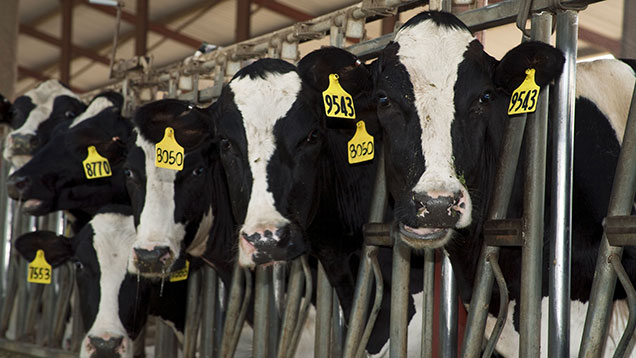World dairy price plunge adds to farmer fears
 © Design Pics Inc/REX
© Design Pics Inc/REX
One of the biggest world dairy price drops of the year has shaken farmers in the southern hemisphere.
The average winning price on Global Dairy Trade (GDT) fell 10.7% on Wednesday (15 July) to US$2,082/t (£1,335/t) – a fresh six-year low.
Supplies to the auction were a little tighter, so the drop shows demand remains sluggish and world production is still running high.
See also: 7p/litre – is this the UK’s lowest milk price?
Key products skim milk powder (SMP) and whole milk powder (WMP) suffered heavy losses.
SMP was down 10.1% to US$1,702/t (£1,091/t) and WMP was back 13.1% to US$1,848/t (£1,185/t).
All prices are now 59% down on last February’s all-time high on the GDT.
Market watchers in New Zealand reacted to the latest bad news.
Prices fall 10-13% overnight. Weak demand accentuated by uncertain financial mkts and global economic outlook https://t.co/shHVsXngTF
— Hayley Moynihan (@hayley_moynihan) July 15, 2015
Global dairy trade a shocker -10.7%. WMP -13%. Our $4.50 payout estimate (lowest in mkt) now looking too high. It’s under review.
— Cameron Bagrie (@ANZ_cambagrie) July 15, 2015
We have dropped our 2015/16 dairy payout expectation to $3.75-4 per kg MS and still see downside risk. Was $4.50.
— Cameron Bagrie (@ANZ_cambagrie) July 15, 2015
AgriHQ Farmgate Milk Price crashes to $4.22 – read more here http://t.co/b8e8debMqq #dairy #agchatnz
— AgriHQ Analysts (@AgriHQAnalysts) July 15, 2015
AgriHQ dairy analyst Susan Kilsby said most farmers could not breakeven at the current milk price projections.
She said farm debt levels would rise and rural communities would suffer as producers cut spending.
New Zealand dairy giant Fonterra has also taken drastic action.
The co-op, which contains the vast majority of the country’s dairymen, is cutting more than 500 jobs to save NZ$55-60m (£23-£25m) a year.
Fonterra chief executive Theo Spierings said change was needed if the company was to stay competitive in the global market.
“Reducing the number of roles in our business isn’t about individual competency, it is about continually improving the way we deliver performance.”
The New Zealand dollar also took a pummelling after the auction result, having already lost more than 15% against the US dollar in 2015.
An AHDB dairy report said more pressure would be on wholesale dairy prices.
“With buyers remaining distant from the market, purchasing only when required, global supply continues to increase,” the report said.
“If the current conditions for milk production continue globally then the most likely cause for reducing supply in the short term will be from an increase in cullings, in the absence of adverse weather or disease outbreaks.”
